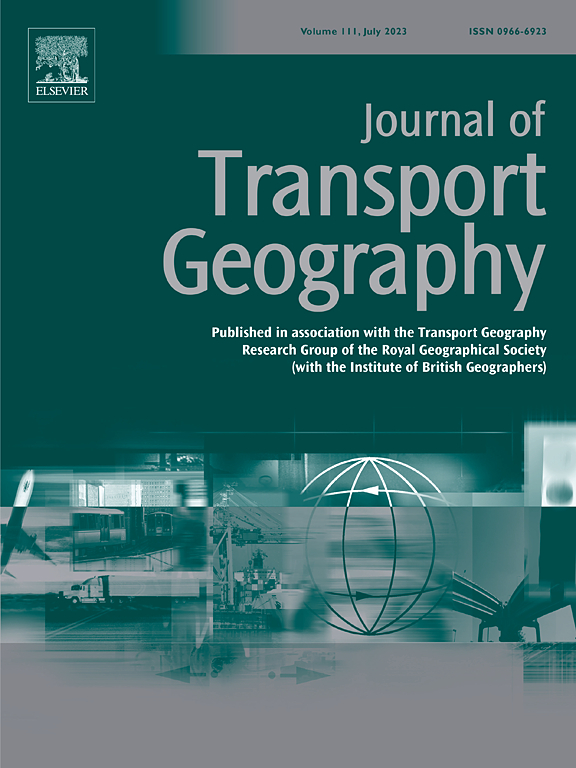Active travel and subjective well-being in Temuco, Chile
IF 5.7
2区 工程技术
Q1 ECONOMICS
引用次数: 0
Abstract
The improvement of active travel would contribute to increasing the minimum rate of physical activity; thus, improving public health. Although the importance of social and physical factors in promoting active travel has been highlighted, there have been few studies on how both simultaneously affect active travel, especially in South America. Furthermore, there is a lack of studies on subjective well-being in urban areas and its contributing factors, particularly in Chile's southern cities. This study aims to investigate the links between active travel and subjective well-being as well as the individual, social, and built environmental factors that are associated with these areas, in the medium-sized southern city of Temuco. A total of six neighborhoods were selected, and 782 respondents were determined by stratified random sampling. Both subjective and objective measurements of the built environment were used in the study. The objectives were examined using a quantitative method and two types of regression analysis, including hierarchical multiple regression and binary logistic regression. Despite a finding that attitude toward cycling has the highest level across all modes of transportation, just a small portion of respondents reported using bicycles for daily transport. The findings show that a variety of factors to active travel include household income, the number of people in the household, the availability of bicycles, attitude toward walking, attitude toward using a private car, social cohesion, role models, accessibility, and the density of all green spaces. In addition, age, private car ownership, belonging to an Indigenous group, employment status, lifestyles, social cohesion, accessibility, and street connectivity are all linked to subjective well-being. Urban policymakers may use these findings to promote subjective well-being and active travel in this city.
智利特木科的积极旅行与主观幸福感
积极出行的改善将有助于提高最低体力活动率;因此,改善公共卫生。虽然社会和身体因素在促进积极旅行中的重要性已经得到强调,但关于两者如何同时影响积极旅行的研究很少,特别是在南美洲。此外,缺乏关于城市地区主观幸福感及其影响因素的研究,特别是在智利南部城市。本研究旨在调查主动旅行与主观幸福感之间的联系,以及与这些地区相关的个人、社会和建筑环境因素。共选取了6个小区,采用分层随机抽样的方法确定了782名回答者。研究中使用了建筑环境的主观和客观测量。采用定量方法和两种类型的回归分析,包括层次多元回归和二元逻辑回归,对目标进行了检验。尽管一项调查发现,在所有交通方式中,对骑自行车的态度最高,但只有一小部分受访者表示每天使用自行车作为交通工具。研究结果表明,影响积极出行的因素包括家庭收入、家庭人数、自行车的可用性、对步行的态度、对使用私家车的态度、社会凝聚力、榜样、可达性和所有绿地的密度。此外,年龄、私家车拥有量、属于土著群体、就业状况、生活方式、社会凝聚力、可达性和街道连通性都与主观幸福感有关。城市决策者可以利用这些发现来促进城市的主观幸福感和积极出行。
本文章由计算机程序翻译,如有差异,请以英文原文为准。
求助全文
约1分钟内获得全文
求助全文
来源期刊

Journal of Transport Geography
Multiple-
CiteScore
11.50
自引率
11.50%
发文量
197
期刊介绍:
A major resurgence has occurred in transport geography in the wake of political and policy changes, huge transport infrastructure projects and responses to urban traffic congestion. The Journal of Transport Geography provides a central focus for developments in this rapidly expanding sub-discipline.
 求助内容:
求助内容: 应助结果提醒方式:
应助结果提醒方式:


